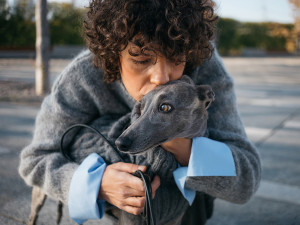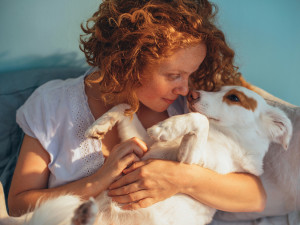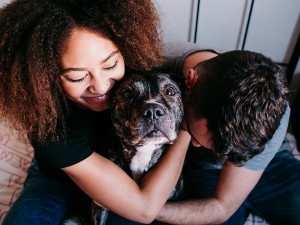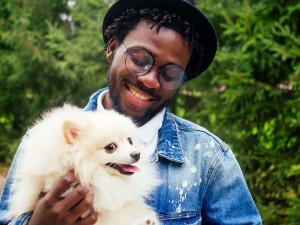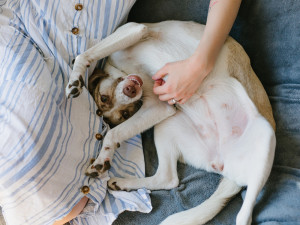Most Dogs Don’t Really Like Being Hugged, New Study Finds
Yeah, it’s kind of heartbreaking, but your loving embrace might be stressing your pup out.

Share Article
We know this isn’t great news (don’t kill the messenger), but according to new research, you might want to hug your dog a little less. Yes, it sounds like an impossible task — but it’s for your pup’s own wellbeing. It turns out that, as much as we love hugging our dogs, most dogs really don’t like being hugged. Don’t worry, there are still plenty of ways to snuggle that you’ll both enjoy. But those big, entrapping, squeeze-y embraces? They’re probably stressing your dog out.
Dogs show signs of stress in response to hugs
Back in 2016, Dr. Stanley Coren, an expert on dog behavior and intelligence, analyzed the first 250 picturesopens in new tab of dogs that popped up when he searched “hug dog” on Google Images and Flickr. He found that 81.6 percent of the dogs exhibited some signs of discomfort in the photos, 10.8 percent had neutral body language, and 7.6 percent looked comfortable. “Signs of stress can be tongue-flicking, ears down, face averted, eyes showing ‘half-moons’ of white, tightly closed mouth, rigid facial muscles, and furrowed brows,” Dr. Karen B. London wrote for us in her in-depth explanation of Dr. Coren’s research. “Dogs who are relaxed and happy tend to have open mouths, relaxed facial muscles, and no signs of stress.”
The new research, recently published in Applied Animal Behaviour Scienceopens in new tab, was able to go a step further and analyze videos of pups rather than still images. By looking at videos, they were able to examine behaviors like nipping, yawning, and blinking that are harder to spot in photos. The study reviewed the 80 most popular videos of dogs being hugged on social media platforms.
They found that 68 percent of the dogs avoided eye contact and turned their heads, 44 percent licked their lips or nose, 60 percent flattened their eyes, 81 percent blinked, and 43 percent panted. In 68 percent of cases, the pups actually nipped or bit at the human. These are all signs that the dogs were uncomfortable during the hugging interactions.

Humans don’t understand signs of stress in dogs
Your instinct might be to argue that your dog isn’t stressed out by hugs. It’s possible they’re not — all pups are different, and as both studies found, not all dogs appear uncomfortable when hugged. But it’s also true that humans aren’t super great at recognizing signs of puppy stress. “Our results showed that many human behaviors may be concerning as humans tend not to necessarily understand the body language or vocalizations shown by dogs, when interacting with them,” Elizabeth Ann Walsh, the study’s lead author, wrote.
When Dr. Coren conducted his initial research, he received a huge pushback from pet parents who claimed their pets loved being hugged…but they shouldn’t have been so confident. “To prove this, they sent me or posted pictures of themselves hugging their dogs, completely ignoring the fact that these images often contained the very same stress signals that I had pointed out in my report,” Dr. Coren wroteopens in new tab in Psychology Today.
Dogs are cursorial animals, Dr. Coren added, which means they’re designed to run swiftly — so, when pups are faced with a threat, their primary defense is to take off. This may be why hugs are so stressful for dogs; when they’re restrained, they’re deprived of their ability to defend themselves by running away if a threat occurs.
Some of the body language that humans find cute in dogs, such as yawning and lip-smacking, are actually calming signals, Walsh explained. And misunderstanding your pup’s behavior can have serious consequences. “This can cause feelings of discomfort, anxiety, fear, distress, and confusion in a dog, which may result in a fractured human/dog bond, welfare issues for the dog, and the possibility of a dog escalating to exhibit defensive/agonistic behavior should communication fail,” Walsh wrote.
So, as well as you think you know your pup, it’s worth familiarizing yourself with some signs of puppy stress. “We advocate for increased education for both adults and children in canine communication,” wrote Walsh. It’ll make your pup happier — even if it means fewer hugs and more ear scratchesopens in new tab.

Sio Hornbuckle
Sio Hornbuckle is the Assistant Editor at Kinship, where they frequently write for the site. As a writer, they specialize in pet news, animal science, and pop culture. They live in New York City with their cat, Toni Collette.
Related articles
How to Tell If Your Dog Is a Hugger—Or Not
Boundaries, folks. Boundaries.
![A woman holding her dog close.]()
FYI, Your Dog Can’t Stand When You Do These 7 Things
Thanks, they hate it.
![Couple hugs their merle Boxer]()
How to Improve Your Relationship with Your Dog
Animal behaviorist Dr. Karen B. London on how to strengthen your pet-parent bond.
![A shy looking dog sitting on a couch.]()
Some Dogs Are Scaredy Cats — And That’s OK
Not all fearful dogs have been mistreated.
![Man hugging his fluffy white dog happily]()
Chemistry Between People and Dogs Is Real (It’s Science)
How the “love hormone” oxytocin connects us with our pups.
![a white dog getting a belly rub]()
Why Do Dogs Like Belly Rubs? The Real Reasons Explained
If one hand isn’t petting a fuzzy dog belly, what are you doing?

